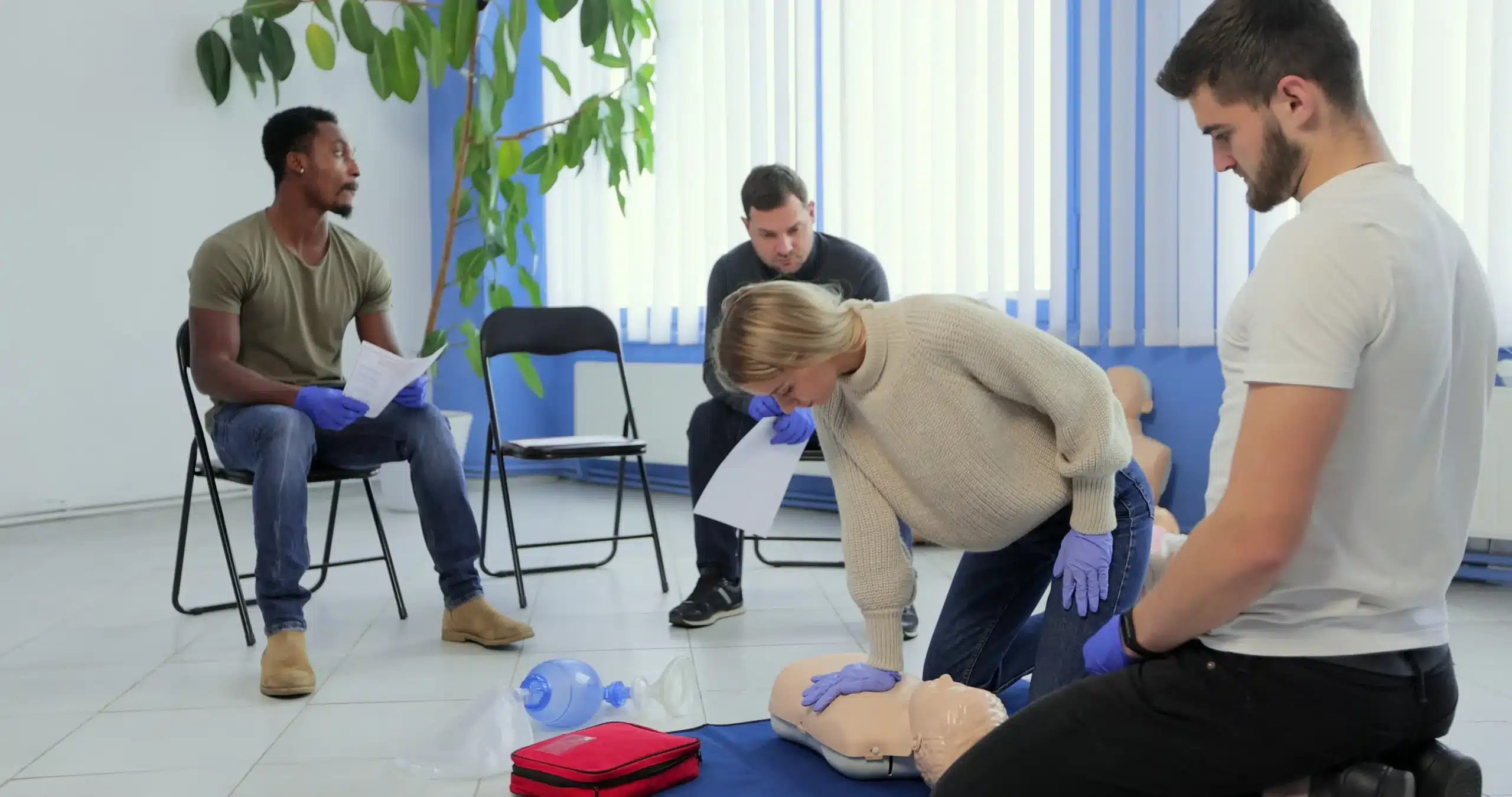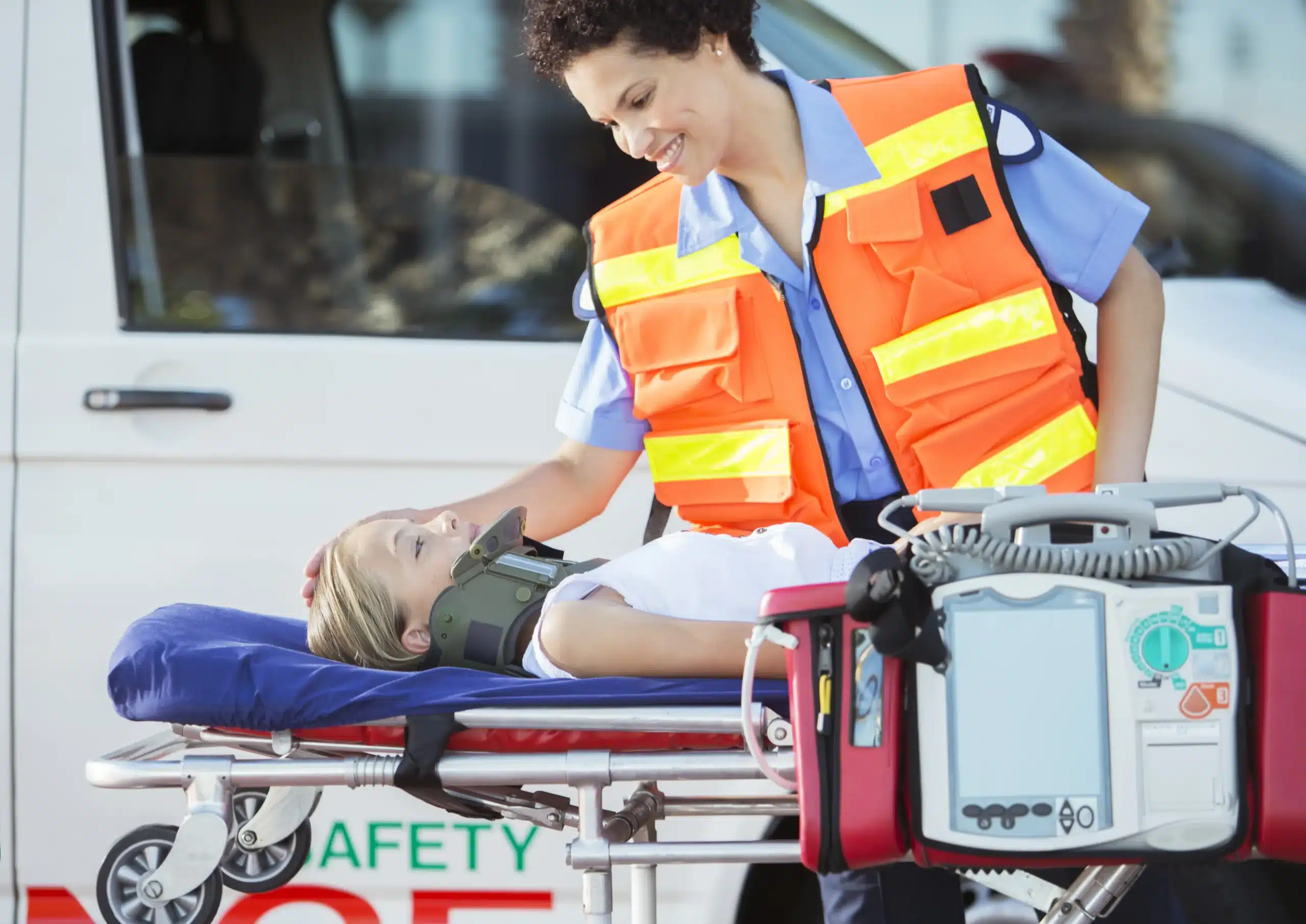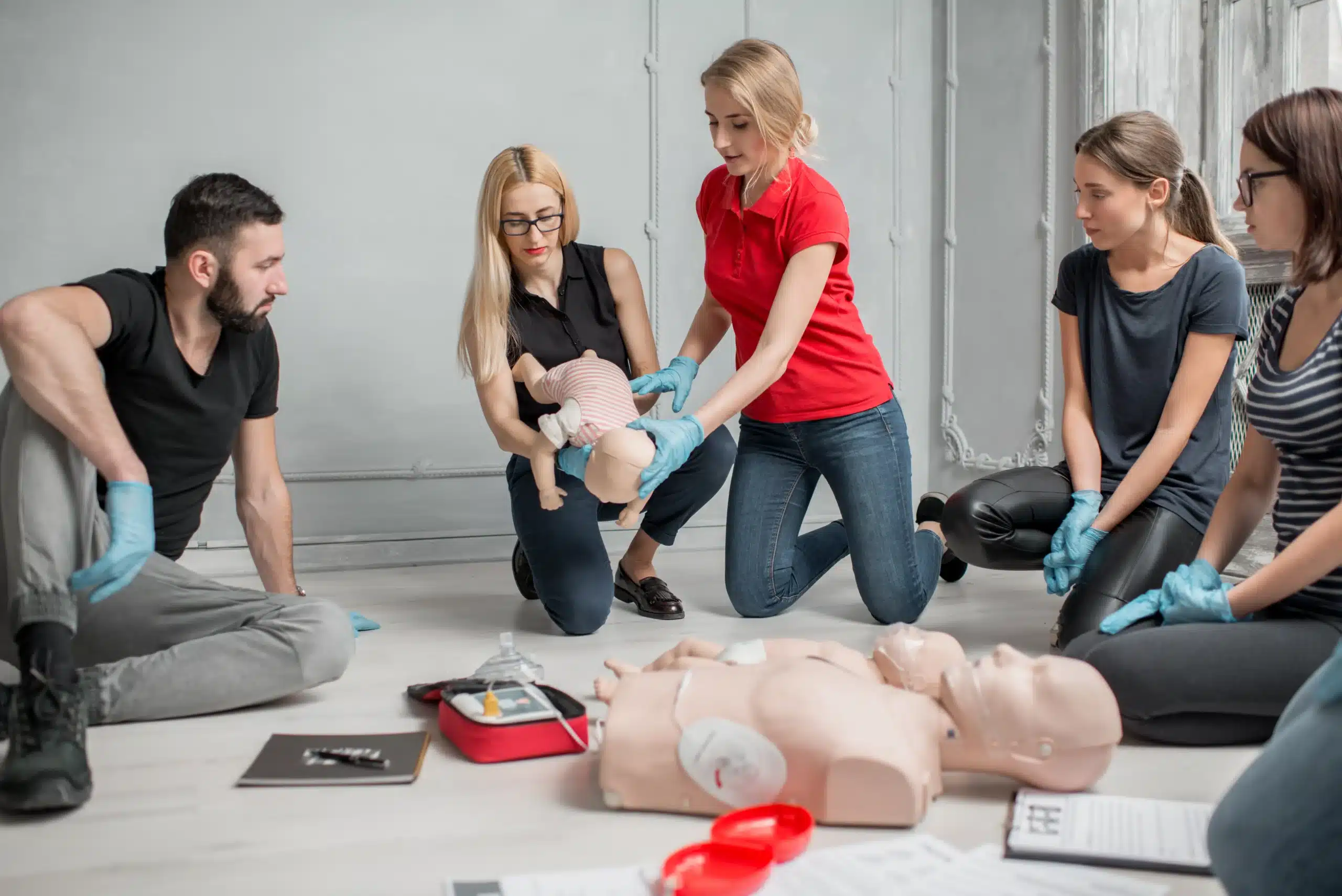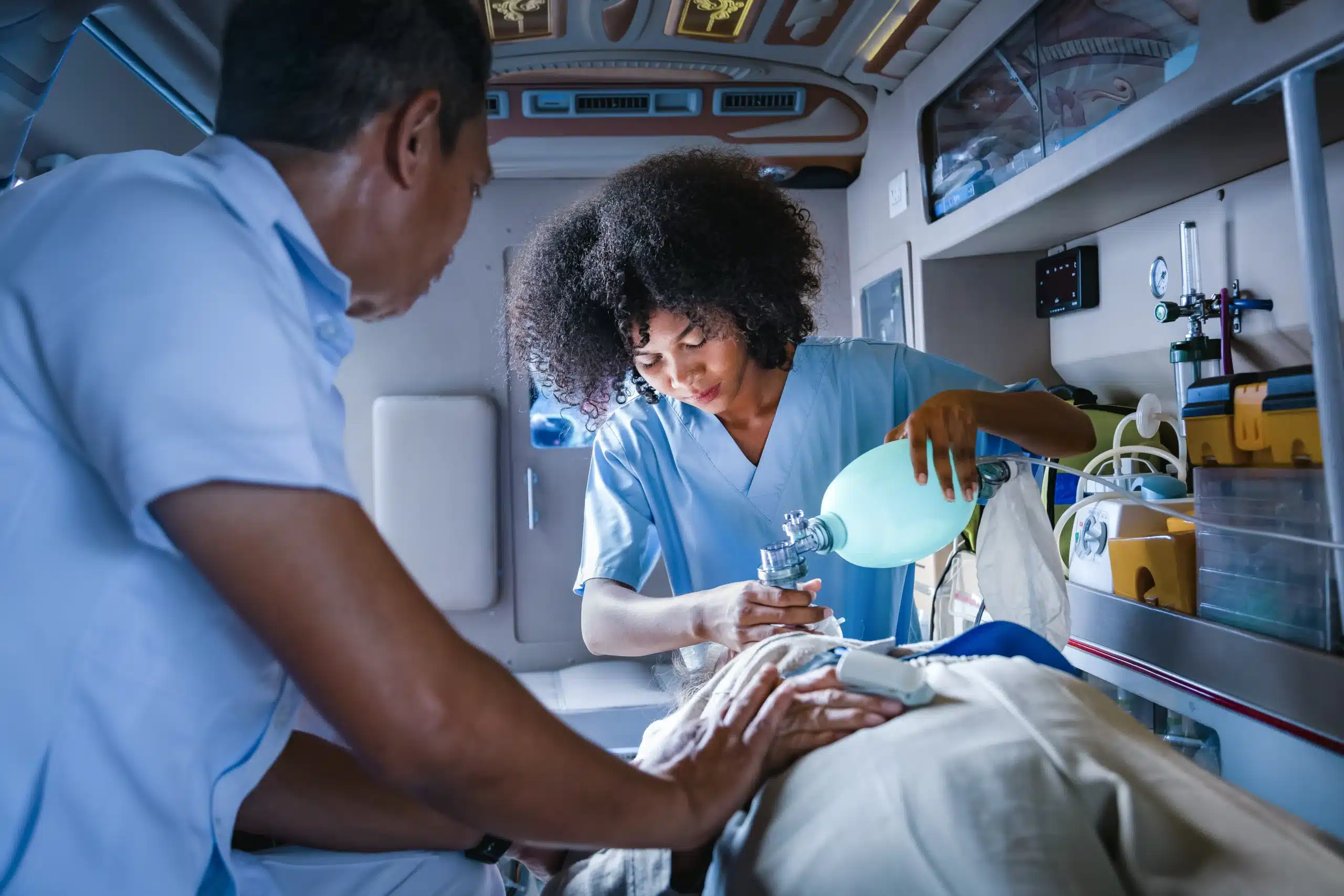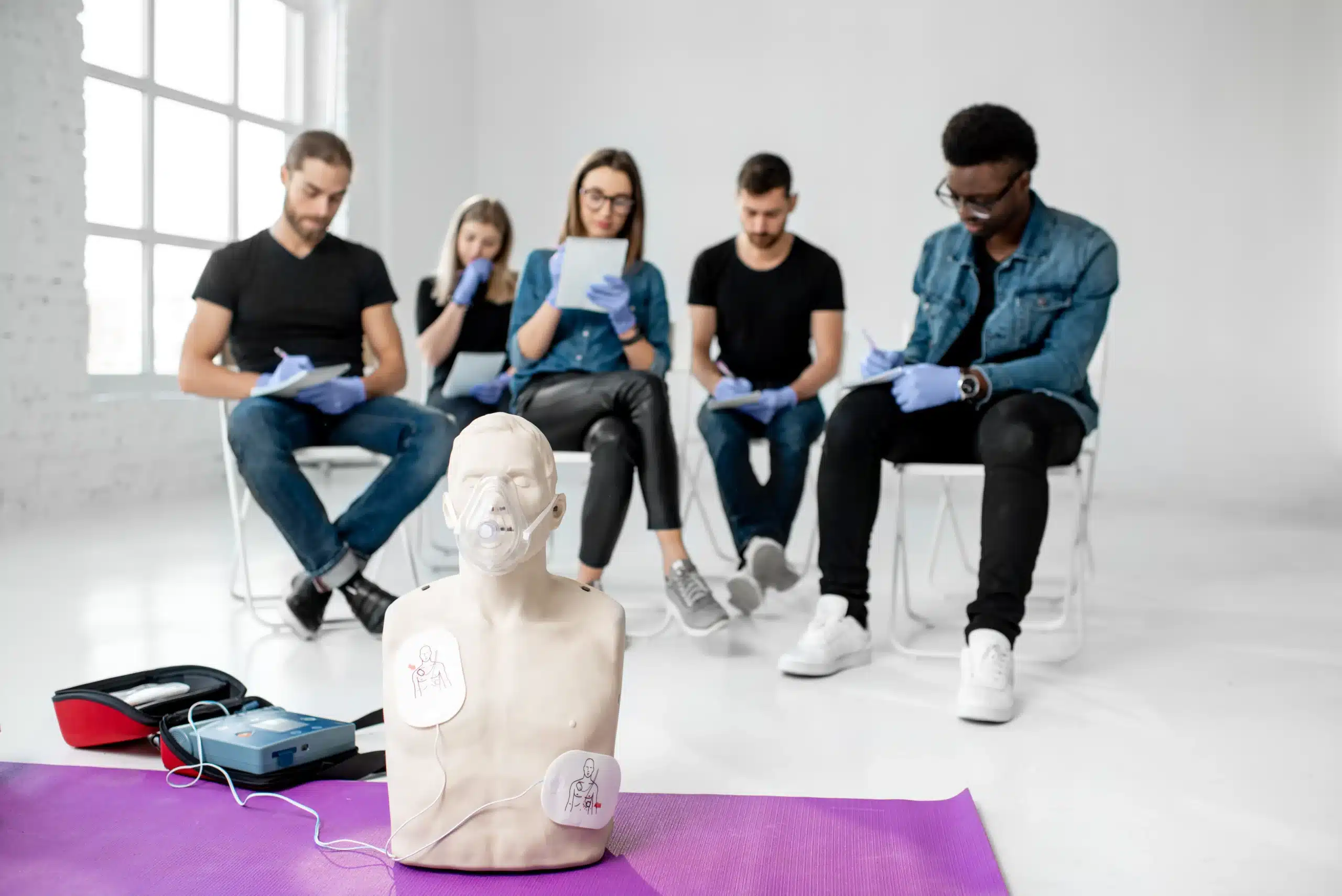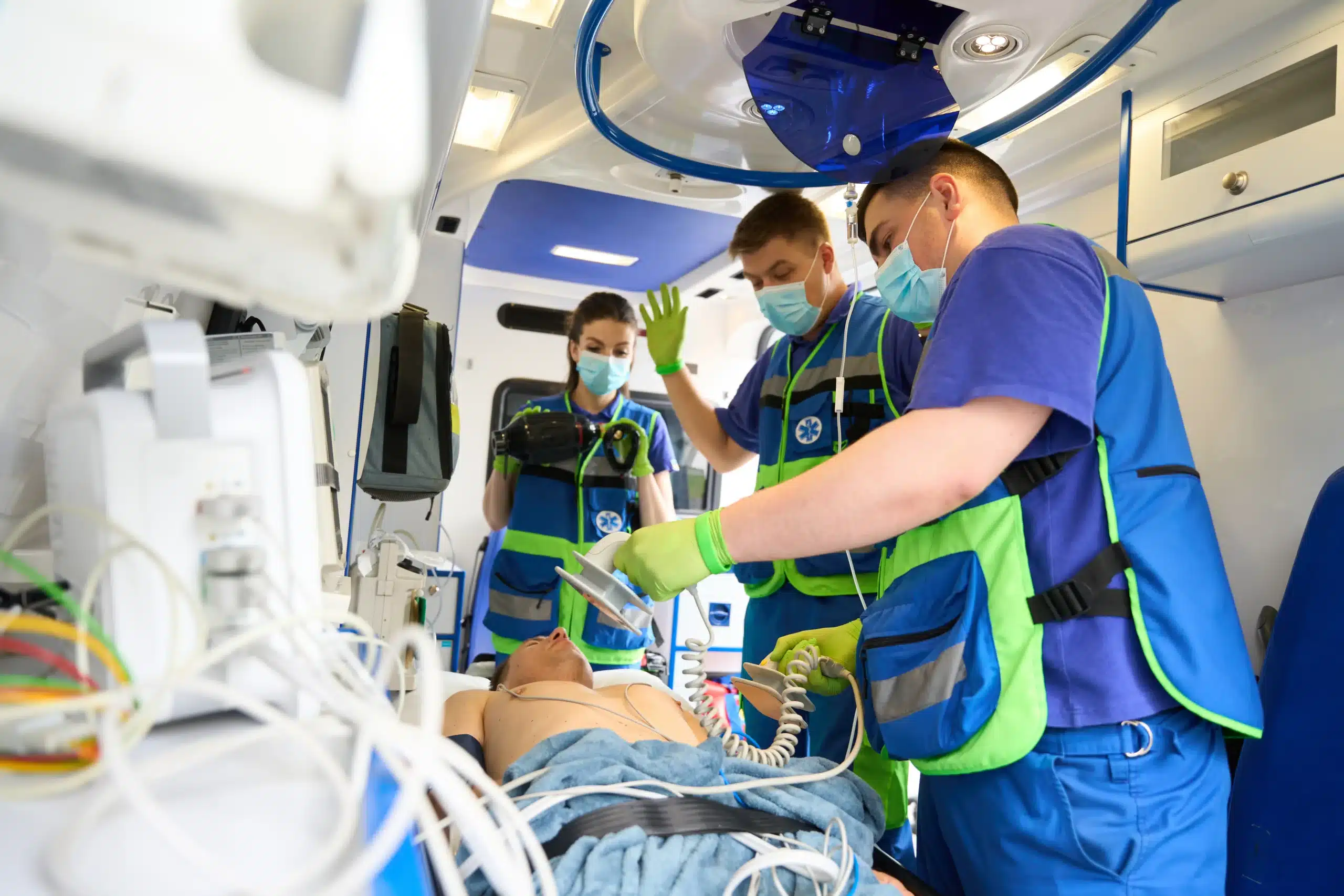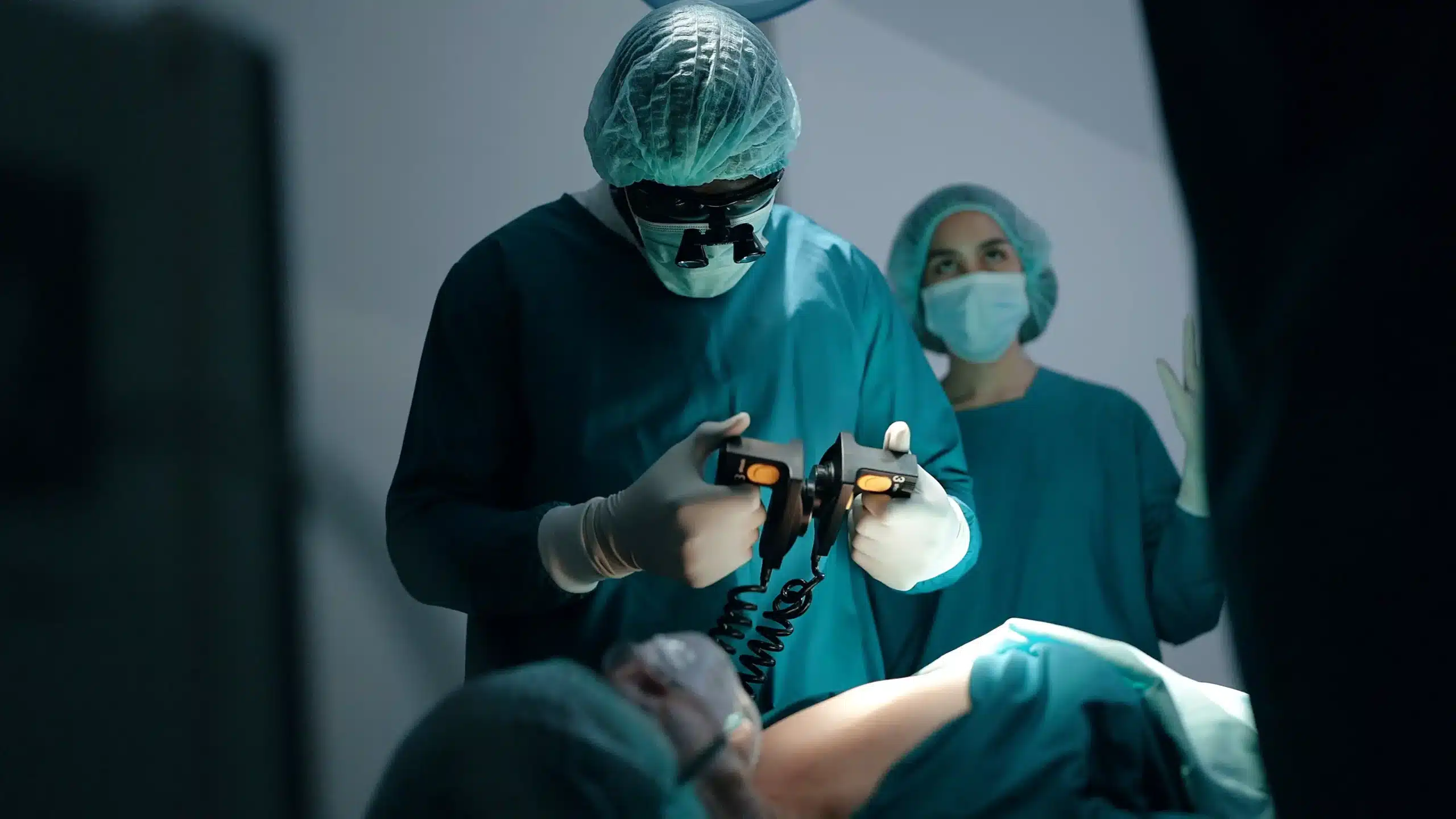Seconds matter in a medical emergency, especially when a child is involved. Knowing pediatric CPR and first-aid can make a profound difference, giving you the confidence to act decisively in stressful situations. This comprehensive guide explores the importance of these life-saving skills, emphasizing the specific techniques used for infants and children. Whether you’re a parent, caregiver, educator, or healthcare professional, this article will help you find the right pediatric CPR and first-aid training in Madera. We’ll discuss course options, costs, benefits, and what to expect in a typical class. Empower yourself with the knowledge and skills to protect the children in your life.
Key Takeaways
- Pediatric CPR and first-aid training equips you with skills tailored to children’s unique needs. These techniques are crucial for responding effectively to emergencies involving infants and children and differ significantly from adult CPR.
- Accessible and affordable training options are available locally in Madera. Look for AHA-certified courses offering flexible schedules and formats like blended learning or in-person classes. Contact providers directly to explore group discounts and specialized programs.
- Becoming certified creates a safer environment for children in your community. Learning these skills not only prepares you for emergencies but also empowers you to make a real difference in a child’s life.
What is Pediatric CPR and First-Aid?
Pediatric CPR and First-Aid training gives you the skills to help infants and children during medical emergencies. It’s designed for anyone caring for kids, from parents and babysitters to childcare providers and teachers. This specialized training focuses on the key physiological differences between children and adults, ensuring you learn the right techniques for each age group. These courses cover various emergency situations, including breathing problems, choking, and injuries.
How It Differs from Adult CPR
Pediatric CPR differs from adult CPR in several important ways. The force and technique used for chest compressions vary depending on the child’s age and size. For infants, rescuers typically use two fingers for compressions, while for older children, the heel of one hand is often sufficient. Mountain Medical offers further information on CPR techniques. The depth of compressions and the ratio of compressions to breaths are also adjusted for children. Even seemingly small details, like the way you position a child’s head to open their airway, can differ from adult techniques. These distinctions are critical for providing effective care and minimizing potential harm. John C. Fremont Healthcare District emphasizes the importance of adapting techniques based on the child’s age.
Why It’s Crucial in Emergencies
In emergencies involving children, seconds matter. Knowing pediatric CPR and First-Aid can be the difference between life and death. These skills empower you to respond quickly and confidently when a child is in distress. While calling 911 is always the first step, you can provide immediate care while waiting for professional medical help. This quick action can stabilize a child’s condition and significantly improve their chances of survival. Fresno CPR Classes offers additional insights into the importance of pediatric CPR. This training equips you with practical skills and gives you the confidence to act decisively in stressful situations.
Where to Find Pediatric CPR & First-Aid Training in Madera
Finding the right pediatric CPR and first-aid training is essential for anyone working with or caring for children. Here are a few options in and around Madera:
Fresno CPR Classes
Fresno CPR Classes offers convenient and affordable training. They provide a variety of CPR certifications, including BLS, ACLS, and PALS, making them a great resource for healthcare providers and community members alike. With daily classes in over 60 cities and a low price guarantee, they strive to make training accessible. Learn more about their BLS certification. They also offer group discounts for families, schools, or community groups. For healthcare professionals looking to refresh their skills, they also provide RQI classes. If you have any questions, you can easily contact them through their website.
Central Valley Medical
Central Valley Medical Education offers a range of American Heart Association (AHA) and Emergency Nurses Association (ENA) courses. They provide initial certifications and renewals for several programs, including ACLS, PALS, BLS, and CPR. Their focus on healthcare provider courses makes them a solid choice for professionals needing to meet licensing or workplace requirements. Find their course locations on their website.
Mountain Medical
Mountain Medical focuses on first aid and CPR training for the Yosemite mountain communities, including areas within Madera County. Their expertise in emergency medical training makes them a valuable resource for residents of these communities. Visit their website to learn more.
American Red Cross Central Valley
The American Red Cross Central Valley chapter offers in-person first aid classes in Fresno. While not directly in Madera, their focus on hands-on training and personalized attention may appeal to those willing to travel a short distance. Explore their first aid classes.
Costs & Benefits of Pediatric CPR & First-Aid Training
Knowing the costs and benefits associated with pediatric CPR and first-aid training can help you make informed decisions about investing in these life-saving skills.
Understanding Course Pricing
Pediatric CPR and first-aid training courses in Madera typically range from $40 to $100. Several factors influence the final price, including the type of certification, the course format (in-person, blended learning, or online), and the specific training center. For example, advanced certifications like BLS, ACLS, or PALS may have higher costs than basic CPR and first-aid training. In-person classes, which often include hands-on practice and personalized instruction, might also have a slightly higher price tag. Check with different providers, like Fresno CPR Classes, for their latest pricing and course options.
Explore Group Discounts & Packages
If you’re training with a group—colleagues, family, or a community organization—explore group discounts. Many training centers, including Fresno CPR Classes, offer reduced rates for group enrollments, lowering the cost per person. Contacting providers directly to discuss group packages and tailored training is a smart way to maximize your budget.
Invest in Life-Saving Skills
While there’s a financial commitment involved, think of pediatric CPR and first-aid training as an investment. These courses give you the confidence to respond effectively during emergencies involving children. From basic CPR and first aid to specialized certifications like RQI, the skills you gain can make a profound difference. This training is invaluable for parents, caregivers, educators, and anyone who regularly interacts with children. Fresno CPR Classes offers a low price guarantee, ensuring high-quality training at a competitive rate. For any questions, contact us to discuss your training needs.
Get Certified in Pediatric CPR & First-Aid
Knowing how to respond to a medical emergency involving a child can be life-saving. Getting certified in Pediatric CPR and First-Aid gives you the skills to handle such situations with confidence. Here’s what you need to know about getting certified:
American Heart Association Certification
Fresno CPR Classes offers a comprehensive selection of American Heart Association certification courses, including BLS, ACLS, PALS, and First Aid. These courses cover essential life-saving techniques for infants and children. Fresno CPR Classes is committed to excellent customer service, offers daily classes in over 60 cities, and has a low-price guarantee—making high-quality training accessible.
Renew Your Certification
CPR certifications are typically valid for two years. Staying current with your certification ensures your skills remain sharp. Fresno CPR Classes makes renewing your certification easy. Check their website for upcoming renewal courses and consider taking a group class to save money.
Access Your Certification Card
After completing your Pediatric CPR and First-Aid training, you’ll receive an American Heart Association (AHA) course completion card. This certification card is valid for two years and verifies your qualifications. Keep it accessible, so you can quickly show your credentials when necessary. Digital copies are often available, too.
Who Needs Pediatric CPR & First-Aid Training?
Knowing how to respond to a medical emergency involving a child is a powerful skill. While we hope we never have to use it, pediatric CPR and first-aid training can make a life-saving difference. But who should consider getting certified? Let’s take a look.
Parents & Caregivers
Parents and caregivers are on the front lines of children’s safety. From scraped knees to more serious incidents, they’re often the first on the scene. Equipping yourself with pediatric CPR and first-aid training provides the confidence and skills to respond effectively in emergencies, giving you the tools to protect the children in your care. As the JCF Hospital notes, their Heartsaver First Aid CPR AED course “teaches basic first aid, CPR, and AED use,” highlighting the universal value of these skills, especially for those responsible for a child’s well-being.
Educators & Childcare Professionals
For educators and childcare professionals, pediatric CPR and first-aid training isn’t just recommended—it’s often a requirement. These professionals are entrusted with the safety of children throughout the day, and emergencies can arise unexpectedly. Fresno CPR Classes offers various certification courses, including convenient online options, designed to meet these professional standards. Having these skills readily available ensures a swift and appropriate response in critical situations, creating a safer environment for the children they supervise.
Healthcare Workers
Healthcare workers, including nurses, paramedics, and other medical professionals, require a high level of proficiency in pediatric care. Their roles often involve responding to emergencies and providing immediate medical assistance to children. Advanced certifications like ACLS (Advanced Cardiac Life Support) and PALS (Pediatric Advanced Life Support) are crucial for these professionals. Madera CPR Classes offers comprehensive courses, including HeartCode Complete, which combines online learning with hands-on skills practice. These advanced courses equip healthcare workers with the skills needed to manage pediatric emergencies effectively.
Coaches & Sports Instructors
Coaches and sports instructors work with children in dynamic environments where injuries are a possibility. From minor sprains to more serious incidents, having CPR and first-aid training is essential. The National CPR Foundation emphasizes the importance of local CPR and first-aid certification training. Quick access to trained personnel can significantly impact the outcome of an emergency, ensuring young athletes receive prompt care. Being prepared creates a safer environment for children participating in sports and recreational activities.
Why Train Locally in Madera?
Madera residents, you have a fantastic opportunity to learn life-saving skills right here in your community. Training locally offers distinct advantages over online-only courses or traveling to larger cities. It’s more convenient, cost-effective, and provides a learning experience tailored to your specific needs. Let’s explore why training in Madera is the best choice.
Practice with Expert Instructors
Madera offers high-quality, expert-led training. Fresno CPR Classes offers HeartCode Complete courses in Madera, combining online learning with hands-on practice. This blended learning approach allows you to study at your own pace and then apply your knowledge with voice-activated manikins under the guidance of certified instructors. These instructors bring years of real-world experience, providing valuable insights and personalized feedback.
Gain Community-Specific Knowledge
Training locally also ensures your education is relevant to the Madera community. The courses offered in Madera cover a comprehensive range of certifications, including ACLS, PALS, BLS, CPR, and First Aid. The curriculum is designed to address the specific needs and challenges of our area. HeartCode Complete courses are especially beneficial for busy professionals and agricultural workers, offering flexible scheduling options.
Get Personalized Instruction
One of the greatest benefits of local training is the personalized instruction. Smaller class sizes allow instructors to dedicate more time to each student, addressing individual questions and providing tailored feedback. Local providers ensure all trainers are certified with extensive experience in emergency medical and first aid. This personalized approach fosters a supportive learning environment where you can feel comfortable asking questions and practicing your skills. You’ll also build connections with your instructors and classmates, creating a sense of community.
What Happens in a Pediatric CPR & First-Aid Class?
Knowing what to expect can help you feel more prepared and confident going into a pediatric CPR and first-aid class. Here’s a glimpse into a typical class:
Course Structure & Duration
Fresno CPR Classes offers HeartCode Complete courses in Madera. These blended learning courses combine online learning with in-person skills sessions. This approach allows you to study the cognitive material at your own pace, then practice your skills with voice-activated manikins and expert instructors. Our training aligns with current American Heart Association guidelines, ensuring you receive the most up-to-date information and techniques. For those seeking more traditional learning, we also offer in-person only classes.
Learn Essential Skills
In a pediatric CPR and first-aid class, you’ll learn how to respond to various emergencies involving infants and children. These courses cover essential first aid for common childhood injuries, CPR techniques specifically adapted for young children and infants, and how to use an AED (Automated External Defibrillator) if necessary. The curriculum is designed for people with little or no medical training who need a course completion card, or for anyone who wants to be prepared for emergencies. Check out our BLS certification page for more information.
How You’ll Be Assessed
Throughout the course, instructors observe your technique and provide feedback. You’ll be assessed on your ability to perform CPR and first aid effectively and confidently. Upon successful completion of the course, you’ll receive an American Heart Association (AHA) course completion card, valid for two years. This nationally recognized certification demonstrates your competency in pediatric CPR and first aid.
Choose the Right Course in Madera
Finding the right pediatric CPR and first-aid course in Madera means doing a little homework. Don’t just settle for the first class you find—take your time to choose one that suits your needs and learning style. This section will walk you through key factors to consider and important questions to ask potential providers.
Factors to Consider
Think about these elements when you’re comparing courses:
- Course Offerings and Certifications: Make sure the course covers pediatric CPR and first-aid and provides a recognized certification, such as one from the American Heart Association. Madera CPR Classes offers several AHA-certified programs, including ACLS, PALS, BLS, and CPR/First Aid, designed for both healthcare professionals and the public. Knowing which certification you need will help you narrow your search.
- Training Format: Do you learn best online or in person? Some courses, like the Heart Code Complete series from Madera CPR Classes, use a blended learning format with online modules and hands-on practice with voice-activated manikins. This offers flexibility while still giving you essential hands-on skills. Think about what works best for your schedule and how you learn.
- Target Audience: Some courses are designed for specific groups, like healthcare providers or parents. Look for a course created for your background and experience level. Madera CPR Classes offers courses for both healthcare professionals (doctors, nurses, EMTs, etc.) and the general public, making it easy to find the right fit.
- Instructor Experience: Experienced instructors can significantly impact your learning. Look for trainers with solid backgrounds in emergency medical services and first aid. Providers like Mountain Medical emphasize their instructors’ decades of field experience, offering valuable real-world knowledge.
Questions for Providers
Don’t hesitate to ask providers these questions:
- Certification Validity: How long is the certification good for? Most American Heart Association certifications last for two years. Confirm this with the provider so you understand when you’ll need to recertify. eHealth CPR clearly states their AHA certifications are valid for two years, which is helpful information upfront.
- Course Content and Updates: What does the course cover? Are materials updated to reflect current guidelines? This ensures you’re learning the most up-to-date life-saving techniques. eHealth CPR mentions their courses are designed for people with little to no medical training, making them accessible to everyone.
- Feedback and Reviews: What do other students say? Check online reviews and testimonials to get a sense of the instruction quality and overall experience. Positive feedback can help you feel confident in your choice. Madera CPR Classes often receives positive reviews, highlighting their training quality. You can also ask the provider directly for references.
- Class Size: Ask about the instructor-to-student ratio. Smaller classes often provide more individual attention and feedback, which can improve your learning. Fresno CPR Classes offers group discounts if you have friends or family who want to take the course with you. They also have a low price guarantee and are known for excellent customer service. Reach out to them through their contact page with any questions. They also offer RQI classes.
Prepare for Your Pediatric CPR & First-Aid Course
Knowing what to expect and how to prepare can make your pediatric CPR and first-aid training smoother and more effective. A little preparation goes a long way in ensuring you get the most out of your course.
What to Bring
Comfort is key when you’re learning, so dress in comfortable clothing that allows for a full range of motion. You’ll be practicing techniques on the floor with mannequins, so athletic wear or casual clothes are ideal. Closed-toe shoes are a must for safety.
While your course will cover everything you need to know, bringing a notebook and pen can be helpful for jotting down extra notes or questions. Many students find it useful to review their notes after class to reinforce what they’ve learned. Consider bringing a water bottle to stay hydrated, especially during longer training sessions.
Pre-Course Materials
Fresno CPR Classes understands busy schedules, and we design our courses to be as accessible as possible. Our Pediatric CPR and First-Aid training follows American Heart Association guidelines. While pre-course study isn’t mandatory for all courses, familiarizing yourself with the basics can give you a head start. Check with your chosen provider—whether it’s Fresno CPR Classes, Mountain Medical, or another reputable organization—to see if they offer any pre-course materials. Knowing the basics can help you focus on mastering the practical skills during the in-person training. Mountain Medical emphasizes that their experienced and certified trainers are there to guide you. They, like Fresno CPR Classes, offer programs designed to fit various schedules, including those of busy professionals.
Community Outreach & Awareness
Knowing how to perform CPR and first aid on a child can truly make a difference in a critical situation. But how do we ensure our community is equipped with these life-saving skills? It all begins with proactive outreach and awareness. Here in Madera, we’re fortunate to have organizations dedicated to spreading these vital skills.
School Partnerships
Collaborations between training providers like Fresno CPR Classes and local schools are key to empowering the next generation with this knowledge. These partnerships often involve bringing certified instructors directly into schools to deliver age-appropriate training. HeartCode Complete courses that blend online learning with hands-on practice using voice-activated manikins, creating an engaging and effective learning experience. This approach equips students with essential skills and integrates seamlessly into the school curriculum.
Community Workshops & Events
Beyond schools, community workshops and events are crucial for making pediatric CPR and first-aid training accessible to everyone. Organizations like Mountain Medical offer training sessions in various locations throughout Madera County, including Oakhurst, Coarsegold, and Mariposa. These workshops provide a convenient and affordable way for families, caregivers, and community members to learn these vital skills. Check with your local community centers, libraries, and healthcare providers for upcoming workshops.
Social Media Campaigns
Social media is a powerful tool for raising awareness about the importance of pediatric CPR and first aid. Organizations like Fresno CPR Classes use social media platforms to share valuable information, promote upcoming training sessions, and highlight the availability of group discounts. These campaigns reach a wider audience and encourage community members to get certified. Following local CPR training providers on social media is a great way to stay informed about training opportunities and local initiatives.
Related Articles
- CPR & First-Aid Training in Fresno: A Complete Guide – Fresno CPR Classes
- Fresno CPR Classes: Your Complete Guide – Fresno CPR Classes
- CPR Courses in Fresno: Find the Right Class for You – Fresno CPR Classes
- Why CPR Matters in Healthcare (And How to Get Certified)
- Importance of CPR and First-Aid Training at Work
Frequently Asked Questions
How do I choose between different CPR and first-aid certifications?
It depends on your specific needs. Basic CPR and first-aid certification is suitable for most people, including parents, caregivers, and teachers. Healthcare providers typically require more advanced certifications like BLS, ACLS, or PALS. Consider your current role and what kind of emergencies you’re most likely to encounter. If you’re unsure, reach out to a training provider like Fresno CPR Classes; they can guide you toward the right certification.
What if I’m nervous about the in-person skills practice?
It’s completely normal to feel a little apprehensive, especially if you’ve never performed CPR before. Certified instructors create a supportive and encouraging environment. They understand that everyone learns at their own pace and are there to guide you through each step. The practice sessions are designed to build your confidence and help you develop muscle memory, so you’ll feel prepared to act in a real emergency. Remember, the goal is to familiarize yourself with the techniques, not to become a medical expert overnight.
Are online-only CPR certifications accepted?
While online courses offer convenience, many organizations and employers prefer certifications that include in-person skills practice. Hands-on training allows you to receive real-time feedback from instructors and refine your technique. Blended learning courses, like those offered by Fresno CPR Classes, combine the flexibility of online learning with the benefits of in-person skills sessions. This approach ensures you have both the knowledge and the practical skills to respond effectively in an emergency.
How often do I need to renew my CPR certification?
Most CPR certifications, including those from the American Heart Association, are valid for two years. Renewing your certification ensures your skills are up-to-date and that you’re prepared to respond confidently in an emergency. Many training providers offer renewal courses that cover the latest guidelines and techniques. Set a reminder on your phone or calendar so you don’t forget to renew.
What if I have a disability or physical limitation?
CPR training providers are committed to making their courses accessible to everyone. If you have a disability or physical limitation, contact the training provider before the class. They can discuss any accommodations you might need to participate fully in the training. They’re there to support you and ensure you can learn these life-saving skills.
